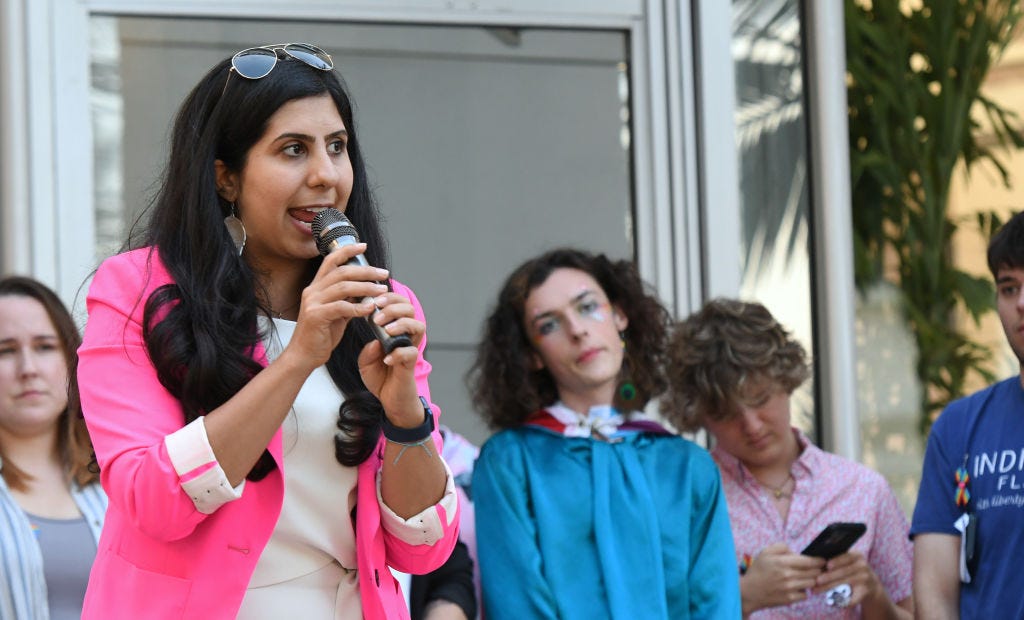You gotta do the work
Florida State Representative Anna Eskamani on working in unlikely spaces, staying optimistic, and how to get results in these times
by Megan Peck Shub
These days, we are all searching for reasons to stay hopeful. Not only is the glass looking half empty, but the liquid is a suspicious color and, frankly, some of us want to dump it out altogether. This is probably not the kind of thinking that will galvanize progress.
But after the GOP victory in November, and with the inauguration looming on Monday, half the country has been mucking through a fundamental tension. On the one hand, we know that we have to move forward, there’s mountains of work to do. On the other hand, the act of hope itself feels — to so many — exhausting, if not impossible in a world in which Mark Zuckerberg is morphing into Elon Musk, Elon Musk is Elon Musk, Carrie Underwood is singing at the inauguration, and Obama is shooting the breeze with Trump at Jimmy Carter’s funeral. Hope — it’s still possible, right?
Enter Florida State Representative Anna Eskamani. Who better to inspire than a successful Democrat in Florida, where there is a Republican supermajority? Back in 2018, Eskamani — then a first-time candidate — flipped her seat. Over three (going on four) terms in office, she’s won the trust of her constituents for her dedicated community outreach, commitment to getting the job done, and strategic approach to her role in the Florida House which involves talking to and working with anyone and everyone.
As her current term ends Eskamani has announced her plans to run for Orlando mayor in December. She stopped to take our call in an Arby’s restaurant on the road to Tallahassee — despite being a vegan. From her unlikely outpost, we discussed the vitality of state politics and how the underdog wins.
This conversation has been condensed and edited for clarity.
Readers like you make The Ink possible. Running a newsletter of quality is expensive. Support independent media today by becoming a paying subscriber. And we are offering a special discount this weekend. Get 50 percent off for your first year!
You're clearly getting through to your constituency in a way that I don't necessarily see every day. I know people have made the AOC comparison, but you're working at the state level, and you’re staying there. What do you wish more people knew about state politics?
How directly it impacts your life. A lot of folks don't even know state government exists. I certainly did not know state government existed when I was growing up in Orlando. No idea. I'm first generation, my parents were immigrants. We really struggled a lot. We struggled financially. My mom died of cancer when I was a young age. It was very, very hard for me and my family, but also made hard by the fact that we didn’t know there were resources out there, there was someone we could call to help us. The only engagement my family had with politics was watching the presidential debates.
The only time I even remember thinking about government, in fact, my only memory of state government was when [former Florida Governor] Charlie Crist vetoed an abortion restriction. And for some reason, that stuck out to me, as a high school student. And then fast forward to when I was leaving high school, there was an effort to change the start times of schools. The first time I ever interacted with local government was at a school board meeting. Those are the only two interactions, from birth to [age] 18, where I had to engage with state government, despite the fact that every part of my life, whether it was the public transportation options, the social safety nets, the pay my teachers got, the tests I was taking — all of it [was] state government.
So for me, it's just helping people understand that not only does it impact your life, but you have efficacy. You have the ability to help shape state government. Because I think that, at the federal level, it often does feel really out of touch and far away. So I really would love for people to see the importance and value of it, to be a part of it.
At what point did you think you would run for office?
I worked [at Planned Parenthood] for 6 years before I ran for office, and it definitely gave me a great foundation for my work in public service. And the legislature was important to me because at Planned Parenthood, I started doing a lot of work in the legislature. I was never a lobbyist, but I would bring patients up to Tallahassee to fight for abortion rights. And I went to Capitol Days in D.C. as well, but I always felt this deeper connection specific to the Florida House because I just think the Florida House is supposed to be the house of the people. It's supposed to be closest to the people, and yet it's so corporate, so disconnected. It's so out of touch, and I felt that, not only was that a disservice, but I felt, like, challenge accepted. I've always been the underdog, and I've always been in Florida and fighting back.
A lot of people are obviously feeling demoralized, after the last election, but I have a feeling that you are rolling up your sleeves.




